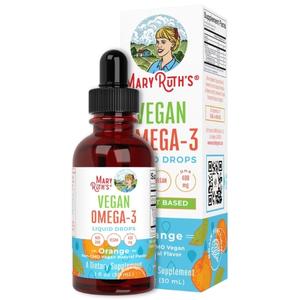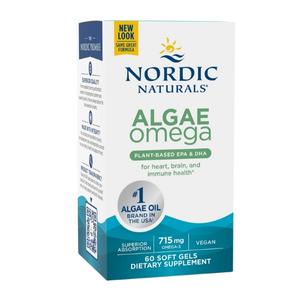5 Best Vegan Omega-3 Supplements 2024: Top Fish Oil Alternatives
All articles are produced independently. When you click our links for purchasing products, we earn an affiliate commission. Learn more about how we earn revenue by reading our advertise disclaimer.
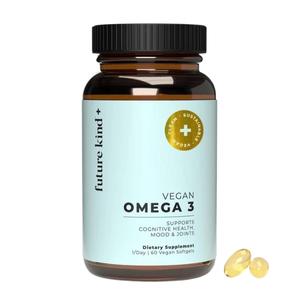
Future Kind Vegan Omega 3 Supplement
- Carrageenan-free.
- Eco-friendly glass bottles.
- Pleasant citrus smell and taste.
10% Off Coupon: HEALTHCANAL
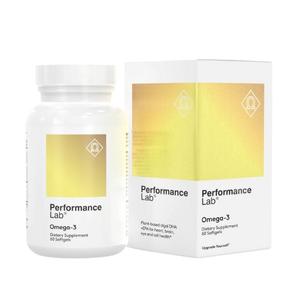
Performance Lab Omega-3
- Carageenan-free soft gels.
- No fishy smell, fishy aftertaste, or gastric distress.
- No refrigeration required.
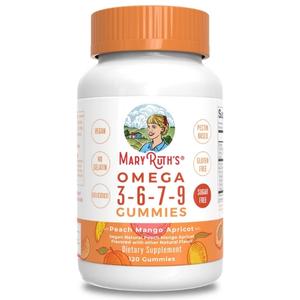
Mary Ruth’s Omega 3-6-7-9 Gummies
- Perfect for families.
- Suitable for children from four years old.
- Easy to consume.
Omega-3 is one of the main essential fatty acids you need in your diet. These fats are important nutrients for brain function, mood regulation, the immune system, heart health, eye health, and infant cognitive development.
There are different types of omega-3. The main forms are alpha-linolenic acid, or ALA, found in plant foods, and eicosapentaenoic acid, or EPA, and docosahexaenoic acid, or DHA, which are found in fatty fish or fish oil supplements. It’s EPA and DHA that are most important for health.
Humans can make small amounts of EPA and DHA by converting ALA, but it’s best for those on a vegan diet to supplement additional EPA and DHA with algae oil.
If you follow a plant-based diet, read on for our review of the best vegan omega-3 supplement.
Best Vegan Omega-3 Supplements On The Market In (April. 2024)
- Future Kind Vegan Omega 3 Supplement – Editor’s Choice
- Performance Lab Omega-3 – Healthiest Vegan Omega-3 Supplement Ingredients
- Mary Ruth’s Omega 3-6-7-9 Gummies – Best Vegan Omega-3 Supplement For Families
- Mary Ruth’s Vegan Omega-3 Liquid Drops – Best Liquid Vegan Omega-3 Supplement
- Nordic Naturals Algae Omega – Best High-Dose Vegan Omega-3 Supplement
Should Vegans Take Omega-3 Supplements?
The National Institutes of Health recommends[1] 1.6 grams of total omega-3s per day for males and 1.1 grams for females.
Omega-3-rich foods on a vegan diet include chia seeds, flaxseeds, flaxseed oil, hemp seeds, and walnuts. However, plant foods only provide omega-3 as ALA, so vegans might need to supplement additional EPA and DHA for optimal health and brain function.
The vegan omegas EPA and DHA in supplements come from marine microalgae,[2] which is also where fish get their omega-3[3] — by consuming algae. Here are some benefits of taking vegan omega-3 supplements.
Health Benefits Of Omega-3 Supplements
Studies show that omega-3 is important for eye health and vision, a healthy heart and cardiovascular system, and brain and cognitive function.
Supports Brain And Cognition
DHA is essential for brain health at all stages of life but is especially important in children and the elderly.[4] It is needed to build neurons,[5] information messengers transmitting signals around the brain.
Studies show that supplementing omega-3 can improve brain blood flow,[6] learning, and memory.
While most cognitive research has been done on DHA supplements, studies suggest that supplementing DHA also increases EPA levels because it reduces our body’s conversion of EPA into DHA. Hence, higher EPA levels might also support the cognitive benefits even if only supplementing DHA.
Reduces Dementia Risk
Omega-3 supplements might even reduce your risk of late-onset Alzheimer’s disease.
30% of the population carries a genetic mutation that increases their risk of Alzheimer’s disease called APOE4. This gene variant increases DHA turnover[7] and reduces brain delivery of DHA.[8]
One study found that six months of supplementing two grams of DHA daily significantly increased DHA and EPA levels in the brain[8] of older adults with cognitive decline, irrespective of APOE genotype. But the increase was three times higher in non-APOE4 carriers.
The researchers suggested that APOE4-carriers likely need at least one gram of DHA daily to reduce dementia risk.
Helps Maintain Heart Health
Supplementing omega-3s can reduce blood cholesterol levels,[9] improving heart health. The Food and Drug Administration says that supplementing EPA and DHA might also reduce blood pressure[10] and the risk of heart disease.
A meta-analysis suggests EPA is more effective in reducing cardiovascular risk[11] than DHA. Other studies suggest that supplementing three grams of DHA daily is most effective for high blood pressure reduction.[12]
Supports Healthy Pregnancy
Pregnant or breastfeeding women require a higher intake of omega-3 fatty acids. These fats are crucial for fetal and infant brain development,[13] so pregnant women should ensure they get enough omega-3 in their diet. DHA is particularly important both prenatally and for postpartum moms who breastfeed.
This increased need puts pregnant women at a higher risk of deficiency, thus potentially putting their babies at risk. Those consuming less than 150 milligrams of DHA on a consistent daily basis will be deficient and are more likely to suffer an early preterm birth.[14]
This can be averted by supplementing 800–1000 milligrams of DHA daily, which significantly reduces the rate of early preterm births and other serious adverse birth events.[15] Other studies suggest that a daily dose of 650 milligrams is best during pregnancy for optimal infant DHA levels[16] at birth.
Even non-vegan mothers can increase their DHA levels and breast milk[17] DHA concentration with daily supplementation. And some women might benefit even more: those who have a genetic variation in the gene FADS1 that reduces the conversion of ALA into DHA.[18]
Reduces The Risk Of Some Eye Diseases
Studies suggest that supplementing one gram of DHA daily might benefit eye health, especially in those with glaucoma, diabetic retinopathy, or age-related macular degeneration.
That’s because DHA has antioxidant and neuroprotective properties, which can reduce the damage caused by oxidative stress[19] in eye diseases. One study found that three months of supplementing DHA alongside citicoline[20] significantly improved vision in glaucoma patients.[21]
However, we still need more research to recommend specific doses of omega-3s for eye diseases.
5 Best Vegan Omega-3 Supplements In 2024
Future Kind Vegan Omega-3 Supplement

10% Off Coupon: HEALTHCANAL
Future Kind’s Vegan Omega-3 supplement is a carrageenan-free, easy-to-swallow soft gel delivered in eco-friendly glass bottles.
- Carrageenan-free.
- Eco-friendly glass bottles.
- Pleasant citrus smell and taste.
- Small and easy to swallow.
- 30-day money-back guarantee.
- Might require refrigeration.
Future Kind is a B-Corp-certified company founded by two vegan nutritionists. Their vegan omega-3 is derived from algal oil and delivered in carrageenan-free soft gels. Each capsule provides 500 milligrams of algal oil with 75 milligrams of EPA and 150 milligrams of DHA.
Customer reviews on the Future Kind website state that they’ve noticed a significant improvement in their mood since taking this supplement. Many are also happy that they only need one capsule per day, whereas other brands require people to take two or more daily.
However, that’s only because Future Kind recommend a lower dose than most, not because their capsules are more concentrated. There are no official recommendations for EPA or DHA, but, for total omega-3 intake, the National Institute of Health recommends 1.6 grams for men and 1.1 grams for women 19-50 years.[1]
Other ingredients in Future Kind’s omega-3 include modified food starch, glycerin, and purified water. Carrageenan,[22] which is usually found in vegan soft gels and might be linked to increased gut inflammation, is not included. The bottle even includes a citrus scent tab for a more pleasant smell and taste.
It costs $29.99 for a two-month supply, equating to $0.49 per serving. Signing up for their subscription costs $23.99 per two-month supply. Future Kind recommends taking one softgel daily, with or without food.
Performance Lab Omega-3
Performance Lab’s omega-3 soft gels are carrageenan-free, and you can save a lot of money by buying in bulk.
- Carageenan-free soft gels.
- No fishy smell, fishy aftertaste, or gastric distress.
- No refrigeration required.
- Expensive per recommended serving.
Performance Lab® Omega-3 is made with Life’s™ OMEGA algal oil and delivered in easy-to-swallow NutriGels®. Performance Lab claims that their supplement provides the optimal two-to-one DHA to EPA ratio associated with balanced immune regulation.
Performance Lab recommends a daily serving of three capsules with your first meal of the day, which provides 990 milligrams of total omega-3 fatty acids, 540 milligrams of DHA, and 270 milligrams of EPA. This equates to 180 milligrams of DHA and 90 milligrams of EPA per capsule. It comes the closest to meeting the NIH-recommended daily intake of omega-3s.
Like Future Kind, this supplement is delivered in a carrageenan-free capsule made from gellan gum, pectin, starch, and glycerin. What’s more, no refrigeration is required, even after opening.
One month’s supply costs $49.00, equating to $1.63 per recommended serving. Or, you can buy a three-month supply for $36.75 per box, working out at $1.23 per serving. However, it works out at around the same price as Future Kind’s supplement per capsule.
Mary Ruth’s Omega 3-6-7-9 Gummies
Mary Ruth’s Omega 3-6-7-9 Gummies provide omega-3 as ALA alongside essential omega-6s and non-essential omega-7 and omega-9. However, this supplement provides no EPA or DHA and contains potentially harmful erythritol.
- Perfect for families.
- Suitable for children from four years old.
- Easy to consume.
- No EPA or DHA.
- Not a big subscription saving.
- Contains erythritol.
Mary Ruth’s Omega 3-6-7-9 Gummies are made with organic vegan omega fatty acids derived from organic flaxseed oil and organic SeaBerry®, which are good sources of ALA, linoleic acid or omega-6, palmitoleic acid or omega-7, and oleic acid or omega-9. They come in three flavors in one bottle: peach, mango, and apricot.
Each gummy provides 54.5 milligrams of omega-3 as ALA. However, this supplement does not provide EPA or DHA. While these gummies might be great for children, adults must consume multiple gummies daily to get a significant amount of ALA. Mary Ruth recommends that children aged between four and 12 take one gummy up to twice daily, and ages 13 and up take one gummy up to four times daily.
Other ingredients include organic isomalto-oligiosaccharides, purified water, organic erythritol, pectin, natural flavors, citric acid, sodium citrate, vitamin C, lecithin, monk fruit extract, and organic sunflower oil. Each gummy provides five calories and two grams of carbohydrates.
Unfortunately, new 2023 research suggests that erythritol isn’t as inert as we once thought. Studies show that a higher intake of erythritol is associated with a greater risk of major cardiovascular events[23] such as stroke, heart attack, and even death.
Each tub of 120 gummies costs $36.95, or $33.26 when you subscribe.
Mary Ruth’s Vegan Omega-3 Liquid Drops
Mary Ruth’s Vegan Omega-3 Liquid Drops provide a high dose of DHA but not much EPA. They are suitable for those who don’t like taking capsules.
- High-dose DHA formulation.
- Orange flavored for picky eaters.
- Suitable for children from four years old.
- Liquid rather than capsules.
- Should be refrigerated.
- Low in EPA.
- Tastes fishy.
Like most vegan omega supplements, Mary Ruth’s Vegan Omega-3 Liquid Drops are derived from sustainably-grown algae. The difference is they are delivered in liquid form, which is perfect for those who do not like taking capsules. However, the fishy taste might put some people off.
The recommended 30 drops provide 756 milligrams of algal oil and 400 milligrams of DHA but only four milligrams of EPA. While this is a very low dose of EPA, studies suggest that supplementing DHA naturally also raises your EPA levels. Each serving of 30 drops provides eight calories and one gram of fat.
Children aged between four and eight years are recommended to take 20 drops, those aged between nine and 13 should take 25 drops, and those aged 14 years and up should take 30 drops daily.
Other ingredients include organic olive oil, rosemary extract, ascorbyl palmitate, sunflower lecithin, sunflower oil, mixed tocopherols, and organic orange oil. Rosemary extract is a potent antioxidant and natural food preservative.[24]
A one-ounce bottle providing 30 servings costs $22.95 as a one-off purchase, reaching $0.77 per serving or $20.66 when you subscribe.
Nordic Naturals Algae Omega
We like that Nordic Naturals Algae Omega capsules are third-party tested and that their certificates of analysis are available online, but sadly this supplement contains carrageenan, which might negatively impact gut health.
- Third-party tested with results available online.
- Non-GMO and hexane-free.
- Highest omega-3 dose per capsule.
- Contains carrageenan.
Each two-capsule daily serving of Nordic Naturals Algae Omega provides 715 milligrams of total omega-3s, of which 390 milligrams are DHA, and 195 milligrams are EPA This equates to 195 milligrams of DHA and 97.5 milligrams of EPA per capsule, the highest of all the supplements we reviewed.
Other ingredients include high-oleic sunflower oil, rosemary extract, natural mixed tocopherols, and ascorbyl palmitate, delivered in a soft gel capsule made from modified cornstarch, glycerin, carrageenan, sorbitol, water, and carob color.
Unfortunately, studies suggest that carrageenan might promote intestinal inflammation[25] and change the gut microbiome.[26] This could be especially problematic for the elderly and people with inflammatory bowel disease.[27] Although it’s considered non-toxic[28] and “generally safe” by the FDA, and the European Food Safety Authority also found “no evidence of any adverse effects in humans,”[29] we do not yet fully understand the fate of carrageenan after digestion.[22] Because of this, carrageenan is banned in infant formula in the European Union for precautionary reasons.
A one-month supply costs $30.95, working out at $1.03 per daily serving or $27.86 monthly when you subscribe. Nordic Naturals recommends taking two soft gels with food or as directed by your healthcare professional or pharmacist.
How to Choose The Best Vegan Omega-3 Supplement
Here are a few points to consider when choosing the best vegan omega-3 supplement for your needs.
- Dose: Your daily dose will depend on your needs. For example, if you are pregnant, breastfeeding, or have the APOE4 gene, you’ll need around one gram daily, while others will likely need less. On the other hand, if you want a supplement suitable for the whole family, you’ll want to choose one with a lower dose per capsule, gummy, or drop so you can scale up and down.
- Capsules vs. liquid: Those who don’t like taking capsules might opt for a liquid dropper bottle, while those who don’t like strong tastes might want to choose capsules to avoid the fishy taste.
- Ingredients: Different omega-3 supplements can contain various ingredients, so it’s best to check the ingredients list before making your choice. For example, you might want to avoid omega-3 supplements containing carrageenan if you have inflammatory bowel disease.
How Much Omega-3 Do You Need A Day?
There is no consensus on the daily dose of EPA or DHA. The minimum recommendation is usually 250 milligrams, while the Academy of Nutrition and Dietetics[30] recommends 500 milligrams of combined EPA and DHA daily.
However, some might benefit from a larger daily dose. For example, the NIH suggests 1.4[1] grams of omega-3s during pregnancy and 1.3 grams during breastfeeding.
A few studies suggest that supplementing even more than three grams daily might benefit those at an increased risk of cardiovascular disease.[31] Still, the safety of such high doses has not been confirmed.
Nevertheless, one gram of DHA from algae[32] daily is considered safe.
Final Thought
A plant-based diet might not provide enough omega-3 as EPA or DHA to maintain health. Hence, those on a plant-based diet must take a vegan omega-3 supplement—especially pregnant or breastfeeding vegan women, young children, and older adults at risk of cognitive decline.
Choosing the best vegan omega-3 supplement suitable for your needs requires a bit of research as they are all different in terms of dose, formulation, and delivery form. In this article, we explained the pros and cons of our top five vegan omega-3 supplements, so you are better informed to choose the best one for you.
Frequently Asked Questions
Yes, vegan omega-3 supplements can provide omega-3s such as ALA, derived from plant foods, or EPA or DHA, derived from sustainably-grown algae.
Vegans can get omega-3 as ALA from plant-based foods such as chia seeds or flaxseeds, so the best type of omega-3s for vegans to supplement are EPA and DHA, as these are not available on a vegan diet.
Vegans should choose an omega-3 supplement with EPA and DHA derived from algae rather than fish and ensure that the supplement is at the required dose for their life stage.
Yes, studies suggest that algal oil omega-3 supplements are as effective as fish oils at raising omega-3 status.
+ 32 sources
Health Canal avoids using tertiary references. We have strict sourcing guidelines and rely on peer-reviewed studies, academic researches from medical associations and institutions. To ensure the accuracy of articles in Health Canal, you can read more about the editorial process here
- Nih.gov. (2015). Office of Dietary Supplements – Omega-3 Fatty Acids. [online] Available at: https://ods.od.nih.gov/factsheets/Omega3FattyAcids-HealthProfessional/.
- Adarme-Vega, T.C., Lim, D.K.Y., Timmins, M., Vernen, F., Li, Y. and Schenk, P.M. (2012). Microalgal biofactories: a promising approach towards sustainable omega-3 fatty acid production. Microbial Cell Factories, [online] 11(1). doi:https://doi.org/10.1186/1475-2859-11-96.
- Adarme-Vega, T.C., Thomas-Hall, S.R. and Schenk, P.M. (2014). Towards sustainable sources for omega-3 fatty acids production. Current Opinion in Biotechnology, [online] 26, pp.14–18. doi:https://doi.org/10.1016/j.copbio.2013.08.003.
- Maltais, M., Lorrain, D., Léveillé, P., Viens, I., Vachon, A., Houeto, A., Presse, N. and Plourde, M. (2022). Long-chain Omega-3 fatty acids supplementation and cognitive performance throughout adulthood: A 6-month randomized controlled trial. Prostaglandins, Leukotrienes and Essential Fatty Acids, [online] 178, p.102415. doi:https://doi.org/10.1016/j.plefa.2022.102415.
- Fang, X., Sun, W., Jeon, J., Azain, M., Kinder, H., Ahn, J., Chung, H.C., Mote, R.S., Filipov, N.M., Zhao, Q., Rayalam, S. and Park, H.J. (2020). Perinatal Docosahexaenoic Acid Supplementation Improves Cognition and Alters Brain Functional Organization in Piglets. Nutrients, [online] 12(7), p.2090. doi:https://doi.org/10.3390/nu12072090.
- Dighriri, I.M., Alsubaie, A.M., Hakami, F.M., Hamithi, D.M., Alshekh, M.M., Khobrani, F.A., Dalak, F.E., Hakami, A.A., Alsueaadi, E.H., Alsaawi, L.S., Alshammari, S.F., Alqahtani, A.S., Alawi, I.A., Aljuaid, A.A. and Tawhari, M.Q. (2022). Effects of Omega-3 Polyunsaturated Fatty Acids on Brain Functions: A Systematic Review. Cureus. [online] doi:https://doi.org/10.7759/cureus.30091.
- Bazinet, R.P., Metherel, A.H., Chen, C.T., Shaikh, S.R., Nadjar, A., Joffre, C. and Layé, S. (2020). Brain eicosapentaenoic acid metabolism as a lead for novel therapeutics in major depression. Brain, Behavior, and Immunity, [online] 85, pp.21–28. doi:https://doi.org/10.1016/j.bbi.2019.07.001.
- Arellanes, I.C., Choe, N., Solomon, V., He, X., Kavin, B., Martinez, A.E., Kono, N., Buennagel, D.P., Hazra, N., Kim, G., D’Orazio, L.M., McCleary, C., Sagare, A., Zlokovic, B.V., Hodis, H.N., Mack, W.J., Chui, H.C., Harrington, M.G., Braskie, M.N. and Schneider, L.S. (2020). Brain delivery of supplemental docosahexaenoic acid (DHA): A randomized placebo-controlled clinical trial. eBioMedicine, [online] 59, p.102883. doi:https://doi.org/10.1016/j.ebiom.2020.102883.
- Li, J.-J., Dou, K.-F., Zhou, Z.-G., Zhao, D., Ye, P., Zhao, J.-J. and Guo, L.-X. (2022). Role of omega-3 fatty acids in the prevention and treatment of cardiovascular Diseases: A consensus statement from the Experts’ Committee Of National Society Of Cardiometabolic Medicine. Frontiers in Pharmacology, [online] 13. doi:https://doi.org/10.3389/fphar.2022.1069992.
- Center (2020). New Qualified Health Claims for EPA and DHA Omega-3. [online] U.S. Food and Drug Administration. Available at: https://www.fda.gov/food/cfsan-constituent-updates/fda-announces-new-qualified-health-claims-epa-and-dha-omega-3-consumption-and-risk-hypertension-and.
- Khan, S.U., Lone, A.N., Khan, M.S., Virani, S.S., Blumenthal, R.S., Nasir, K., Miller, M., Michos, E.D., Ballantyne, C.M., Boden, W.E. and Bhatt, D.L. (2021). Effect of omega-3 fatty acids on cardiovascular outcomes: A systematic review and meta-analysis. eClinicalMedicine, [online] 38, p.100997. doi:https://doi.org/10.1016/j.eclinm.2021.100997.
- Lee, J.B., Notay, K., Klingel, S.L., Chabowski, A., Mutch, D.M. and Millar, P.J. (2019). Docosahexaenoic acid reduces resting blood pressure but increases muscle sympathetic outflow compared with eicosapentaenoic acid in healthy men and women. American Journal of Physiology-Heart and Circulatory Physiology, [online] 316(4), pp.H873–H881. doi:https://doi.org/10.1152/ajpheart.00677.2018.
- Massari, M., Novielli, C., Mandò, C., Di Francesco, S., Della Porta, M., Cazzola, R., Panteghini, M., Savasi, V., Maggini, S., Schaefer, E. and Cetin, I. (2020). Multiple Micronutrients and Docosahexaenoic Acid Supplementation during Pregnancy: A Randomized Controlled Study. Nutrients, [online] 12(8), p.2432. doi:https://doi.org/10.3390/nu12082432.
- Elsevier.com. (2023). Redirecting. [online] Available at: https://linkinghub.elsevier.com/retrieve/pii/S2405-4577(22)01414-0.
- Carlson, S.E., Gajewski, B.J., Valentine, C.J., Kerling, E.H., Weiner, C.P., Cackovic, M., Buhimschi, C.S., Rogers, L.K., Sands, S.A., Brown, A.R., Mudaranthakam, D.P., Crawford, S.A. and DeFranco, E.A. (2021). Higher dose docosahexaenoic acid supplementation during pregnancy and early preterm birth: A randomised, double-blind, adaptive-design superiority trial. EClinicalMedicine, [online] 36, p.100905. doi:https://doi.org/10.1016/j.eclinm.2021.100905.
- Christifano, D.N., Gustafson, K.M., Carlson, S.E., Sultanna, N., Brown, A., Sands, S.A., Colombo, J. and Gajewski, B.J. (2022). Maternal Docosahexaenoic Acid Exposure Needed to Achieve Maternal–Newborn EQ. Nutrients, [online] 14(16), p.3300. doi:https://doi.org/10.3390/nu14163300.
- Yang, Y., Li, G., Li, F., Xu, F., Hu, P., Xie, Z., Lu, X., Ding, Y. and Wang, Z. (2022). Impact of DHA from Algal Oil on the Breast Milk DHA Levels of Lactating Women: A Randomized Controlled Trial in China. Nutrients, [online] 14(16), p.3410. doi:https://doi.org/10.3390/nu14163410.
- Li, P., Chen, Y., Song, J., Yan, L., Tang, T., Wang, R., Fan, X., Zhao, Y. and Qi, K. (2022). Maternal DHA-rich n-3 PUFAs supplementation interacts with FADS genotypes to influence the profiles of PUFAs in the colostrum among Chinese Han population: a birth cohort study. Nutrition & Metabolism, [online] 19(1). doi:https://doi.org/10.1186/s12986-022-00683-3.
- Lafuente, M., Rodríguez González-Herrero, M.E., Romeo Villadóniga, S. and Domingo, J.C. (2021). Antioxidant Activity and Neuroprotective Role of Docosahexaenoic Acid (DHA) Supplementation in Eye Diseases That Can Lead to Blindness: A Narrative Review. Antioxidants, [online] 10(3), p.386. doi:https://doi.org/10.3390/antiox10030386.
- https://www.facebook.com/Drugscom (2022). Citicoline Uses, Benefits & Dosage Herbal Database. [online] Drugs.com. Available at: https://www.drugs.com/npp/citicoline.html.
- Anton, A., Garcia, V., Muñoz, M., Gonzales, K., Ayala, E., del Mar Sanchez, E. and Morilla-Grasa, A. (2022). The Effect of Oral Citicoline and Docosahexaenoic Acid on the Visual Field of Patients with Glaucoma: A Randomized Trial. Life, [online] 12(10), p.1481. doi:https://doi.org/10.3390/life12101481.
- David, S., Shani Levi, C., Fahoum, L., Ungar, Y., Meyron-Holtz, E.G., Shpigelman, A. and Lesmes, U. (2018). Revisiting the carrageenan controversy: do we really understand the digestive fate and safety of carrageenan in our foods? Food & Function, [online] 9(3), pp.1344–1352. doi:https://doi.org/10.1039/c7fo01721a.
- Witkowski, M., Nemet, I., Alamri, H., Wilcox, J., Gupta, N., Nimer, N., Haghikia, A., Li, X.S., Wu, Y., Saha, P.P., Demuth, I., König, M., Steinhagen-Thiessen, E., Cajka, T., Fiehn, O., Landmesser, U., Tang, W.H.W. and Hazen, S.L. (2023). The artificial sweetener erythritol and cardiovascular event risk. Nature Medicine. [online] doi:https://doi.org/10.1038/s41591-023-02223-9.
- Nieto, G., Ros, G. and Castillo, J. (2018). Antioxidant and Antimicrobial Properties of Rosemary (Rosmarinus officinalis, L.): A Review. Medicines, [online] 5(3), p.98. doi:https://doi.org/10.3390/medicines5030098.
- Pogozhykh, D., Posokhov, Y., Myasoedov, V., Gubina-Vakulyck, G., Chumachenko, T., Knigavko, O., Polikarpova, H., Kalashnyk-Vakulenko, Y., Sharashydze, K., Nakonechna, O., Prokopyuk, V., Onishchenko, A. and Tkachenko, A. (2021). Experimental Evaluation of Food-Grade Semi-Refined Carrageenan Toxicity. International Journal of Molecular Sciences, [online] 22(20), p.11178. doi:https://doi.org/10.3390/ijms222011178.
- De Siena, M., Raoul, P., Costantini, L., Scarpellini, E., Cintoni, M., Gasbarrini, A., Rinninella, E. and Mele, M.C. (2022). Food Emulsifiers and Metabolic Syndrome: The Role of the Gut Microbiota. Foods, [online] 11(15), p.2205. doi:https://doi.org/10.3390/foods11152205.
- Borsani, B., De Santis, R., Perico, V., Penagini, F., Pendezza, E., Dilillo, D., Bosetti, A., Zuccotti, G.V. and D’Auria, E. (2021). The Role of Carrageenan in Inflammatory Bowel Diseases and Allergic Reactions: Where Do We Stand? Nutrients, [online] 13(10), p.3402. doi:https://doi.org/10.3390/nu13103402.
- Younes, M., Aggett, P., Aguilar, F., Crebelli, R., Filipič, M., Frutos, M.J., Galtier, P., Gott, D., Gundert‐Remy, U., Kuhnle, G.G., Lambré, C., Leblanc, J., Lillegaard, I.T., Moldeus, P., Mortensen, A., Oskarsson, A., Stankovic, I., Waalkens‐Berendsen, I., Woutersen, R.A. and Wright, M. (2018). Re‐evaluation of carrageenan (E 407) and processed Eucheuma seaweed (E 407a) as food additives. EFSA Journal, [online] 16(4). doi:https://doi.org/10.2903/j.efsa.2018.5238.
- Scientific Committee on Food SCF/CS/ADD/EMU/199 Final Opinion of the Scientific Committee on Food on Carrageenan. (2003). Available at: https://ec.europa.eu/food/fs/sc/scf/out164_en.pdf.
- Vannice, G. and Rasmussen, H. (2014). Position of the Academy of Nutrition and Dietetics: Dietary Fatty Acids for Healthy Adults. Journal of the Academy of Nutrition and Dietetics, [online] 114(1), pp.136–153. doi:https://doi.org/10.1016/j.jand.2013.11.001.
- Zhang, X., Ritonja, J.A., Zhou, N., Chen, B.E. and Li, X. (2022). Omega‐3 Polyunsaturated Fatty Acids Intake and Blood Pressure: A Dose‐Response Meta‐Analysis of Randomized Controlled Trials. Journal of the American Heart Association, [online] 11(11). doi:https://doi.org/10.1161/jaha.121.025071.
- Turck, D., Castenmiller, J., De Henauw, S., Hirsch‐Ernst, K.I., Kearney, J., Maciuk, A., Mangelsdorf, I., McArdle, H.J., Naska, A., Pelaez, C., Pentieva, K., Siani, A., Thies, F., Tsabouri, S., Vinceti, M., Cubadda, F., Frenzel, T., Heinonen, M., Marchelli, R. and Neuhäuser‐Berthold, M. (2021). Safety of oil from Schizochytrium limacinum (strain FCC‐3204) for use in food supplements as a novel food pursuant to Regulation (EU) 2015/2283. EFSA Journal, [online] 19(1). doi:https://doi.org/10.2903/j.efsa.2021.6345.

